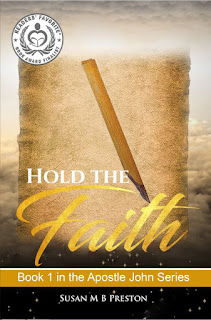Most Thursdays in 2019 we will be interviewing one of the members of Christian Writers Downunder – to find out a little bit more about them and their writing/editing goals.
Today interview Susan Preston
Question 1: Tells us three things about who you are and where you come from.
I am Scottish by birth, Australian by choice, and grateful for the culture of both
The town of my birth is a historical ‘Royal Burgh.’
I have always loved history.
Question 2: Tell us about your writing. What do you write and why?
This now becomes complicated as I have recently written a non-fiction book, but before that I wrote Biblical Fiction
The Apostle John Series is a 5-book series set in 1st century Ephesus. It came about because of an in-depth Bible study on the gospel of John, which whetted my curiosity, and I started researching to check what I had heard in the Bible study series. As for the Apostle John being married… that was a ‘what if’ scenario… although there are some strange ideas on the Internet about his ‘wife.’ I chose to ignore them and have him a widower with a family.
Question 3: Who has read your work? Who would you like to read it?
A mixture of young and old, male and female, and I appreciate every one. I also appreciate the people who judged the books for the awards they won.
Non-fiction: I would like everyone who NEEDS to read it, to read it. I particularly would like some of the care agency staff to read it. (This is why I am planning a follow-up specifically targeting the ‘helpers.’)
Question 4: Tell us something about your process. What challenges do you face? What helps you the most?
The biggest challenge I used to face was being side-tracked. Research became addictive for me and I would find myself going off at many tangents.
Now, my challenges are health ones but they haven’t stopped me. Slowed me at the moment, but my mind is busy. ☺
Question 5: What is your favourite Writing Craft Book and why?
I do not have one particular writing craft book, I have a bunch of ebook versions – when I can find them in among all the other books. But, yes. I know how to search the content and find them. Other than that I have found Mark Dawson’s SPF community very helpful. (Finding the time to be there is my biggest problem at the moment.)
Question 6: If you were to give a shout-out to a CWD author, writer, editor or illustrator – who would they be?
There are lots of lovely authors in CWD, unfortunately my visits there have been rather sporadic since the oxygen and the hospital appointments, not to mention admissions. However, I would ‘shout out’ to Jeanette O’Hagan, who does so much, is so welcoming… and writes interesting stories.
Question 7: What are your writing goals for 2019/2020? How will you achieve them?
First, will be the follow up oxygen book. I was surprised by the fact it ‘spoke to’ other people with chronic, life-limiting illnesses. Someone said to me recently, “We don’t know how living with this feels.” Another said, “I don’t know how to help you.” So, for all the people out there without a voice, but living with serious health problems, I will do the follow up book.
My other project will be another Biblical one, but set farther back in time. Off to the Old Testament for this one.
I will achieve them by putting my bottom on the chair in front of the computer and starting to pull all the ‘bits’ together. This will include asking for help from people with the knowledge.
Question 8: How does your faith impact and shape your writing?
My faith is a way of life. It’s not something I ‘put on’ to go to church. I could do a lot better, but I aim to live what I believe. Some would say that limits me in that there are some subjects I do not write about, but I am not ‘walking in their moccasins.’
Actually, I learned a lot from those early Christians who would go to the arena rather than deny their faith. (Hopefully, that will not be something required of me.) My fiction writing tends to be about strong, committed characters who live their lives in the world (and time period they are in).
The non-fiction is aimed at being a way of helping others. It’s true what Stella Budrikis said in the professional review of the book… “She has written the sort of book she wished she could have had herself when she first started home oxygen therapy.”
What I can do to serve others is limited, this is something I can do.
Susan Preston brings early Christianity to life by writing fiction based on fact for people who enjoy Biblical history.
Research, fascination and curiosity took over and thus began this series where characters became ‘family.’
Life experiences were not always happy – the death of a son, then in 2013 the death of her husband. The emotions from all her experiences contribute to her writing prowess. Now, the new challenge of living tethered to a machine… who knows what that will end up triggering.
Website: https://www.susanprestonauthor.com
(Her book covers show her name as Susan M B Preston to differentiate her from another Susan Preston who had books on Amazon.)













